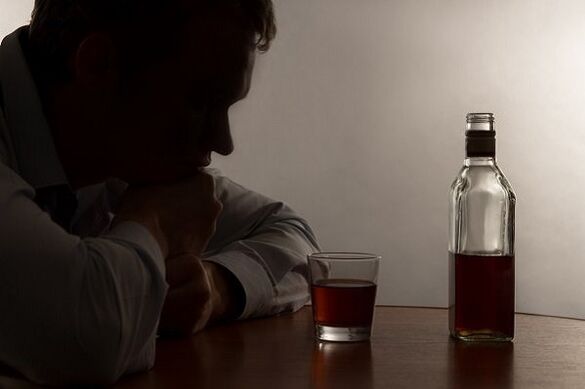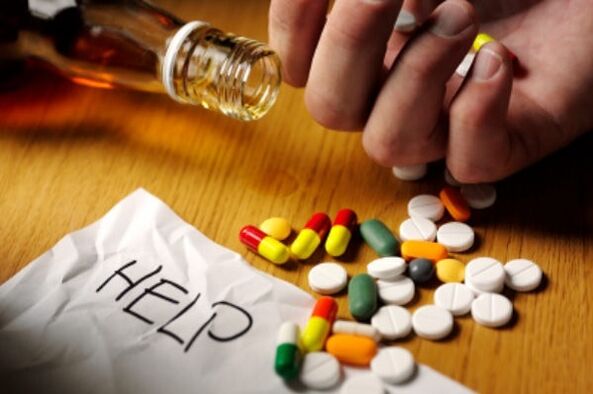People who drink and those close to them believe that it is much better and more correct to stop drinking suddenly than to give up the bad habit gradually. Such a method does not work as effectively for everyone, then people wonder how to gradually stop drinking, causing minimal damage to health.
Is it possible to suddenly stop drinking
Having decided to abruptly give up alcohol, drunkards often fail, again returning to their addiction. In addition, addiction to alcohol only strengthens, because the body, having abruptly stopped receiving the usual ethanol, tries to store it for future use.
People who drink for a long time get so used to the effects of alcohol on the body that a sudden refusal not only brings them unpleasant sensations, but even more binds them to the bottle when they break. In addition, often such attempts to part with addiction affect the physical and mental state of health of a person, exacerbating it even more. However, alcoholism is not a desire to drink, but rather an addiction that is formed on several levels, and the sudden abandonment of which leads to disastrous consequences.
Important!It is possible to stop drinking alcohol abruptly if the addiction lasts less than a year.

People with long-term alcoholism will not be able to give up the "green snake" once and for all. Their launch should be staggered, and ideally under the supervision of a narcologist. This is due to the fact that with a sudden rejection of the habit, chronic diseases can worsen, mental problems that did not exist before will develop. To prevent negative feelings of refusal from becoming a reason to resume drinking, physician control, support from family and friends, and the use of a gradual refusal technique instead of breaking upbrutal with addiction are needed. Tools sold freely on the Internet are also helpful in this regard.
What changes will occur in the body
After giving up alcohol for the first time, feelings in a person can be subjectively unpleasant. This is due to the negative effect of ethanol on the body, as well as the fact that the drunkard has not yet restored his health.

During the first few weeks from the time of refusal, a person may experience depression, become ill often, and experience episodes of depression. Such a reaction is explained by a decrease in immunity and the fact that the body has not yet adapted to the new conditions and is trying to return everything to its usual course. People during this time tend to take the bottle back, believing that it is better than being sick all the time.
Important!As a first step, there should be people next to the former alcoholic who can give him psychological support and explain that his health will return to normal as soon as the body is completely free of toxins.
Once the seizure is over and the body recovers, the former drunkard will feel much better and may even notice it. Improvements will appear in:
- increase the body's defenses;
- improve the condition of the skin;
- improve memory;
- stability in the work of the heart and blood vessels;
- normalization of digestion and urination processes.
Alcoholics do not see immediate improvement in their general condition as soon as they stop drinking. It takes a while for the body to cope with the addiction. You have to remember this and not expect quick results.
Alcohol withdrawal syndrome
Drunkards often refer to their fear of alcohol withdrawal when defending their desire to drink. What is it and how to stop drinking alcohol so that this kind of unpleasant complications does not develop?
Withdrawal is the normal response of the human body to a sudden rejection of something. In the case of alcoholism, it manifests itself mainly in such a dangerous condition as delirium tremens.

Delirium tremens is expressed in the fact that a few days after refusing to drink, a person loses control of himself. In this case, the following symptoms may appear:
- insomnia;
- panic attacks;
- hallucinations;
- rave.
In a state of such psychosis, a former alcoholic poses a serious danger not only to himself, but also to those around him. Symptoms develop mainly in the evening and in the morning, while the person is calm during the day and at night.
It has been proven that alcoholic psychoses develop mainly in people who drink, who have been drinking alcohol for a long time and abruptly gave up it.
With the gradual abandonment of regularly consumed harmful products, withdrawal syndrome very rarely develops. This is another reason for the step by step knotting with the "green snake".
Gradual failure is the key to success
If you drink for a long time and you can not imagine yourself without a bottle of beer or a glass of vodka, doctors recommend seeking specialized help. The narcologist, to whom comes such a patient, who realizes that he has a problem, will give recommendations about the gradual rejection of alcohol.
Stopping drinking gradually is the best option for chronic drunkards. At the same time, it becomes possible to combine various methods of drug treatment, ranging from medication to psychotherapy sessions.
Progressive failure consists of several stages.
- First, a person must accept that there is a problem and be prepared to deal with it. This stage is one of the most difficult, as alcoholics often do not consider themselves sick from anything.
- Second, you need to overcome your pride and seek medical help. This stage can also be difficult for an addictive person, as it means admitting that they have weaknesses that they are facing.
- Third, it will be necessary to start a coherent and progressive struggle. To do this, you will need to follow the recommendations of the doctor, avoid drink companies, radically change your approach to life.

If a person stops drinking gradually, they are much more likely to face their addiction once and for all. In this case, the body manages to adapt to the changes, gets rid of accumulated toxins, forms new positive habits to replace old negative ones.
Gradual refusal to drink alcohol is an option for people whose addiction has already progressed to a chronic stage, when it is impossible to suddenly stop drinking. With such a method of parting from an addiction, medical advice, a positive attitude and perseverance, as well as the support of loved ones will be required. The more responsible a person is for the need to stop drinking, the higher the chances of success.































